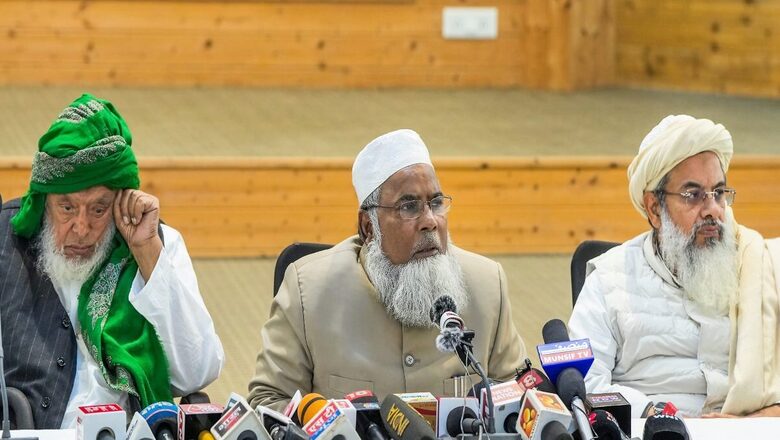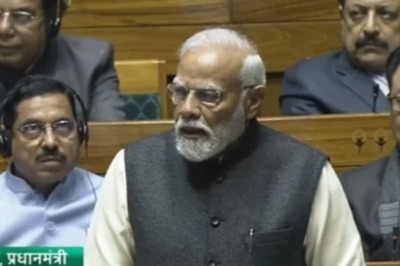
views
The All-India Muslim Personal Law Board (AIMPLB) might be the best-known pan-India Muslim group but it is also arguably one of the community’s worst enemies within. Always ready to pick a fight in the name of protecting Muslim identity, it has done immense damage to the collective Muslim interests over the years. And despite a series of setbacks in the course of its many misguided campaigns to preserve symbols of Islamic identity, it is not done yet.
How little it has learned from its previous mistakes that continue to haunt the community is evident from its gratuitous intervention in the Supreme Court’s recent verdict on divorced Muslim women’s right to claim maintenance under the country’s secular.
While Muslim women welcomed the ruling as a progressive step, the Board was quick to denounce it. At a hurriedly convened meeting, its Working Committee adopted an angry resolution calling it “against the Islamic law (Shariah)” and authorising its president Maulana Khalid Saifullah Rahmanihas to initiate “all possible measures to have the verdict rolled back”.
Apart from the resolution’s arcane theological argument for “rolling back” the ruling, it is its quaint language that gives away the Board’s medieval worldview. It is worth reading for its sheer incoherence and the Board’s slender grasp of what the verdict is about.
This is what it says: “The Holy Prophet had mentioned that amongst all possible deeds the most abhorred is divorce in the sight of Allah, hence it is desirable to continue the marriage by applying all permissible measures to safeguard it…However, if married life becomes difficult to maintain, then divorce was prescribed as a solution to mankind.”
Therefore, it goes on: “This judgement will create further problems to these women who have successfully come out of their painful relationship.”
One will be hard put to imagine a more convoluted and confused response to the ruling. The fact is that it has nothing to do with the rights or wrongs of divorce. It is about what happens after the divorce: namely, to ensure that the divorced Muslim woman is entitled to seek adequate maintenance under the country’s secular law — like all Indian citizens.
It does not close the Muslim Personal Law route but only offers an alternative “religion-neutral” route via Section 125 of the CrPC if the first doesn’t work.
To portray it as some sort of an anti-Muslim conspiracy by calling it “against the Islamic law” is a gross misinterpretation of what the judgement said.
It seems that the Board’s grandees have either not understood the judgement or have taken to deliberate obfuscation.
Women’s rights campaigner Zakia Soman of the Bharatiya Muslim Mahila Andolan said that the clarification made by the court had been “long overdue” describing it as “a significant incremental step in the right direction”.
If Hindu and Christian women were entitled to alimony under Section 125 CrPC, “so why leave out Muslim women?”, she asked.
Another prominent activist Flavia Agnes complimented the court for introducing a “socially beneficial provision” and upholding the divorced Muslim woman’s rights to claim maintenance under mainstream secular laws. “With this judgement, we have travelled a full circle from the controversial Supreme Court ruling in the Shah Bano case in 1985,” she said.
That judgement was infamously overturned by the then Congress government under pressure from AIMPLB and other fundamentalist Muslim groups. It was replaced by the Muslim Women (Protection of Rights on Divorce) Act of 1986 (MWA) significantly diluting the SC’s historic ruling.
This had created confusion as to whether the MWA had the effect of barring divorced Muslim women from claiming maintenance under Section 125 of the CrPC. The new judgement clears that confusion — clarifying that the CrPC route is still very much open to them.
But AIMPLB’s instinct invariably is to oppose anything with the faintest hint of secularism. It has been associated with every single failed ostensibly meant to protect Muslim identity — most memorably its shameful campaign to overturn the 1985 Shah Bano case and the disastrous movement to “save” Babri Masjid under the leadership of Syed Shahabuddin.
Its long history is replete with embarrassingly regressive campaigns. Its high-profile leadership comprising “scholars, legal experts, and representatives of various Islamic organisations across India”, as its website claims, can’t claim credit for a single progressive measure that might have helped the Muslim community in its daily struggle for economic survival — let alone educational and professional aspirations.
The Board was established in 1973 with the stated aim of “protecting and promoting the application of Islamic personal law among Muslims of India”.
In plain English to advance a perverse and self-serving interpretation of 1,400-year-old Sharia laws many of which involve serious violations of basic human rights, gender equality and freedom of expression — and have been given up even by many deeply conservative Islamic countries.
The Board sees the Muslim Personal Law as “not merely a cultural issue or an issue of customary practices for the Muslims”.
“Rather it is an issue which concerns the safeguarding and conservation of their religion which burdens them with grave responsibilities and they are, as a result, very sensitive about it,” says its mission statement.
Issues like jobs, education, security and housing don’t figure in its agenda. Rather than obsessing with narrow sectarian issues, the Board had spent a fraction of its energy on more pressing basic bread-and-butter problems, the Muslim community may not have been in the sort of dire state it is in today.
The problem is that most Muslim groups have a similar worldview and together they have contributed to the rise of Hindu majoritarian forces.
As the cliche goes, with friends like these, you don’t really need enemies.
Finally, here’s a cautionary tale for India’s Muslim men who have taken their women for granted for far too long: A Dubai princess has become the new poster girl for Arab women after she took to social media to divorce her philandering husband declaring “talaq, talaq, talaq” three times.
Sheikha Mahra bint Mohammed bin Rashid al-Maktoum, whose father, Sheikh Mohammed, is the ruler of Dubai, wrote in an Instagram post addressed to her husband, Sheikh Mana bin Mohammed bin Rashid bin Mana al-Maktoum, and shared with half a million followers, that she had had enough of him.
In an apparent reference to his serial infidelity, she wrote: “Dear Husband, as you are occupied with other companions, I hereby declare our divorce. I divorce you, I divorce you, I divorce you. Take care. Your ex-wife.”
So, the writing is that Muslim women are fighting back and “talaq, talaq, talaq” is no longer a one-way street.
The writer is an independent columnist and the author of ‘Unmasking Indian Secularism: Why We Need A New Hindu-Muslim Deal’. Views expressed in the above piece are personal and solely those of the author. They do not necessarily reflect News18’s views.


















Comments
0 comment